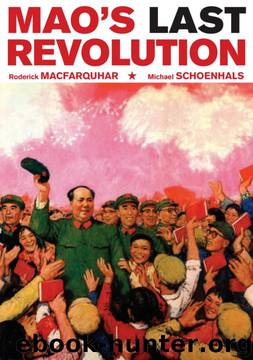Mao's Last Revolution by Roderick MacFarquhar;Michael Schoenhals

Author:Roderick MacFarquhar;Michael Schoenhals [Schoenhals, Roderick MacFarquhar;Michael]
Language: eng
Format: epub
Published: 2009-09-17T01:17:00+00:00
In the light of later events, it is legitimate to wonder if Mao hoped that the abolition of the office of head of state might be an issue with which he could trap Lin Biao, on the assumption that Lin might believe that, as heir apparent, he ought to occupy that post just as Liu had done. This possibility gains credence from the revelation in the memoirs of Wu Faxian that Wang Dongxing read Mao's own words to the Politburo: "I, Mao Zedong, do not want to be Chairman. If [the Politburo] decides to maintain such a position, it is Lin Biao who should hold the position." According to Wu's account, Wang invited Lin Biao's senior military colleagues to dinner and repeated the Chairman's preference for Lin to be state chairman if that office were recreated. Allegedly, Lin's wife, Ye Qun, was eager for him to have it, perhaps so that she could become first lady, and activated his supporters in furtherance of this aim.' However, there is no proof either of Ye Qun's ambitions or that Lin wanted the post, and reportedly he vigorously rejected the idea later in the year.'°
Although party historians have been encouraged to condemn the concept of and the need for the Cultural Revolution, none has ever dared claim that in order to bring it about, the Chairman was prepared ruthlessly to resort to plotting the downfall of his former close comrades-in-arms. The master strategist gone astray in his old age is an acceptable image; the gang leader masterminding dirty tricks is not. The impact on the party's legitimacy would be too great." Yet if Mao plotted successfully to remove his first heir apparent, there is no prima facie reason why he should not have set about plotting to remove his second one, as part of an effort to undo PLA dominance within the reconstructed CCP. After the Cultural Revolution, the head-of-state issue was deemed proof of Lin Biao's plot to "capture supreme power. 1112 Could Mao have been setting him up for such an accusation? The facts may never be known; motivations are still obscure. But why else would Mao have claimed, when he was still building his case against Lin Biao and before Lin's flight and death, that "a certain person was very anxious to become state chairman, to split the Party, and to seize power"?"
Mao was in Wuhan when he made his proposal. He ordered Wang Dongxing to return to Beijing to inform Zhou Enlai. The same day, March 8, 1970, Zhou presided over a Politburo meeting at which Mao's proposal was predictably endorsed, and three groups were organized to manage the logistics and prepare the necessary reports. On April ii, however, Lin Biao in Suzhou had his secretary phone Mao's secretary-the Chairman was by now in Changsha-and suggest that the post of head of state should be retained and that Mao should fill it. Later in the day, Lin's secretary phoned the Politburo office and elaborated on Lin's message to Mao. For Mao not to be head of state would be contrary to the psychology of the people.
Download
This site does not store any files on its server. We only index and link to content provided by other sites. Please contact the content providers to delete copyright contents if any and email us, we'll remove relevant links or contents immediately.
The Secret History by Donna Tartt(18188)
The Social Justice Warrior Handbook by Lisa De Pasquale(11957)
Thirteen Reasons Why by Jay Asher(8461)
This Is How You Lose Her by Junot Diaz(6451)
Weapons of Math Destruction by Cathy O'Neil(5841)
Zero to One by Peter Thiel(5498)
Beartown by Fredrik Backman(5369)
The Myth of the Strong Leader by Archie Brown(5243)
The Fire Next Time by James Baldwin(5024)
How Democracies Die by Steven Levitsky & Daniel Ziblatt(4966)
Promise Me, Dad by Joe Biden(4911)
Stone's Rules by Roger Stone(4866)
100 Deadly Skills by Clint Emerson(4695)
A Higher Loyalty: Truth, Lies, and Leadership by James Comey(4555)
Rise and Kill First by Ronen Bergman(4548)
Secrecy World by Jake Bernstein(4393)
The David Icke Guide to the Global Conspiracy (and how to end it) by David Icke(4386)
The Farm by Tom Rob Smith(4329)
The Doomsday Machine by Daniel Ellsberg(4250)
